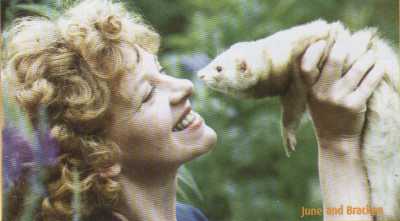Back to Basics - The Scars That Never Heal
 June McNicholas takes a look at what happens to traumatised rescue ferrets that never completely recover their trust in people.
June McNicholas takes a look at what happens to traumatised rescue ferrets that never completely recover their trust in people.
People want to tell a story with a happy ending. Perhaps that's why most is heard about rescue ferrets that are taken in as bad-tempered, frightened, animals but who become gentle affectionate and fun-loving.
In an ideal world that would happen in every case. Sadly it does not. For a certain percentage of rescue cases, previous life may have been so horrific, so traumatic, that they cannot completely recover their trust in people. It is a relatively small percentage - surprisingly small when you consider the number of ferrets taken into rescue and the awful circumstances that often precede their rescue - but what happens to these poor ferrets? Who will take them on, and how can they be given a good life?
The first stage is obviously in the rescue centre itself. Fortunately, most people who run rescues are very familiar with aggression that is borne of fear, hunger or resentment at unkind handling. Plentiful food, quiet surroundings, warmth and understanding are all that is needed in the first instance. It is always vital to let the ferret feel as relaxed as possible before trying to socialise with him. A couple of days peace and quiet is always beneficial. Where there is an injury that needs urgent attention, this clearly has to be a priority but it does mean that the 'settling' period is prolonged, especially if daily medication has to be given. Where this is necessary we try to understand that the treatment may well make the ferret even less trusting of people. After all, he doesn't know we are trying to help. If possible one of us does medication alone so that the ferret does not learn to distrust both of us. Once the treatment phase is over, we proceed as though the ferret had just arrived, putting him in a new area with plenty of food, keeping him quiet and undisturbed (apart from feeding and checking, of course) for a couple of days.
Then comes the time to try to handle him! It's worth sitting and talking quietly to a new ferret for a day or two. It doesn't matter what you say - quote Shakespeare or read the paper to him if you like - just let him come and see, hear and smell your presence. Even though you may be impatient to hold him or stroke him, it is easier to take things slowly rather than make a mistake and have to work twice as hard to put it right again. I have found the 'tub' method very useful for hand-shy ferrets. Simply take a margarine tub, yogurt pot or cup of some type and put something yummy at the bottom. It's often better not to have anything too yummy like Ferretone at first in case it sparks a possessive reaction. Margarine or yogurt is fine, as is a little egg, cream or milk. Yes, I know none are particularly good for ferrets if given in quantity but we are talking 'treat' here. When the ferret puts his head into the tub/cup you can start talking softly and stroke his back. This lets him associate hands and voices with good things while his teeth are safely inside a container! For many ferrets, this can be the first time they have been touched in friendship and affection. A few days of this can make a huge difference to the trust built between ferret and owner. Some ferrets are 'sharp' simply because they have always been hungry so a ready ad-lib food bowl is invaluable.
Although most ferrets will respond in time to gentle treatment and patient handling, it is a sad fact that some will remain 'unpredictable'. Take our Lizzie, for example. Her history was horrendous and she genuinely has no reason to like, let alone trust people. Yet there has been improvement. She may still bite my partner Jeff but she no longer bites me (well, not so much and not so painfully!) In an odd sort of way she has built a relationship with us. At first we hoped she would become as sweet and as friendly as her sister and their combined kits, but it was not to happen. We obviously carry on trying to gain her trust, playing with her and petting her. Often she will have none of it. Yet she is happy. She is no longer fearful of the world or sudden noises and strange people. Her affection is entirely for her ferret family and she is genuinely happy with them. Some days she accepts handling and stroking, others she wants us to go away as quickly as possible. We let her decide and we are grateful for the progress she had made. We have learned her limits and we accept them.
Ferrets such as Lizzie are difficult to rehome because we can't honestly say they will become affectionate trusting pets. We keep most of the 'Lizzies' that come into our care. However, there are some special people who are willing to take on such a ferret and to take the time and the patience to progress in the relationship.
I can only salute them for their selflessness. They are willing to slowly negotiate a mutually acceptable set of interactions with no guarantee of total success. Granted, they may never be able to take him to PR events or to bask in the glory of winning a rosette at a show but that is not why they adopted that particular ferret.
For these special people the main reason for taking on a ferret is to give love and protection and, most importantly, to give then a better second part of their life than they experienced in their first.
